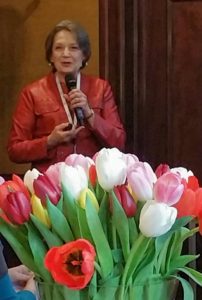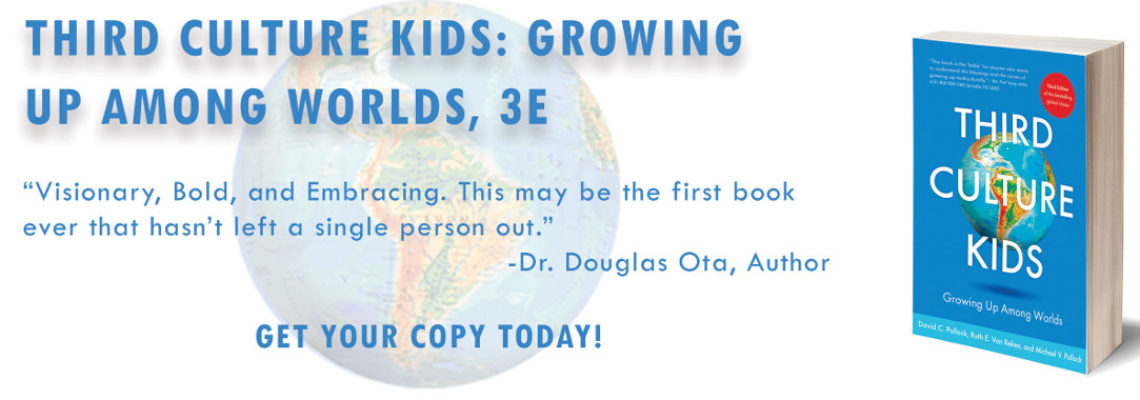The Magic of Relationship
Why/How Does It Happen?
 In March, I traveled for two incredible weeks. The first week I spent interacting with adult third culture kids (ATCKs) who had come for a reunion at their former boarding school in Asia. As I watched the happy hugs on arrival, the telling of both hard and wonderful memories, the tears that also came, I knew they were allowing me to share in their sacred spaces. Some had not been back or seen each other for forty years. And yet, here they were – daring to believe that there were important sparks to kindle from relationships and experiences shared in years long gone. Many stayed together in smaller groups the following week to explore places that also held important memories for them. Pictures of foods and locations unknown to me but obviously delightful to them were shared with one another. What was this magical connection I was not only watching, but feeling with them despite the fact I had grown up on a totally different continent than they?
In March, I traveled for two incredible weeks. The first week I spent interacting with adult third culture kids (ATCKs) who had come for a reunion at their former boarding school in Asia. As I watched the happy hugs on arrival, the telling of both hard and wonderful memories, the tears that also came, I knew they were allowing me to share in their sacred spaces. Some had not been back or seen each other for forty years. And yet, here they were – daring to believe that there were important sparks to kindle from relationships and experiences shared in years long gone. Many stayed together in smaller groups the following week to explore places that also held important memories for them. Pictures of foods and locations unknown to me but obviously delightful to them were shared with one another. What was this magical connection I was not only watching, but feeling with them despite the fact I had grown up on a totally different continent than they?
The second week I arrived in The Netherlands and went to The Hague where I did a session on TCKs for new staff at Zein International Child Care and a more impromptu talk with parents there. The staff and parents were from many nationalities with different experiences, yet I left both sessions feeling my life somehow connected with their’s. Why? During those days I also renewed my friendship with the owners of Zein, Robbie and Jan, and others I had met in previous trips. How, after five years apart, did it feel as if we had been together only yesterday?
 Then on to Amsterdam and the Families in Global Transition Conference. It was our 16th conference but the first to be held outside the USA – #FIGT NL16, to be exact. And the same magic happened. Attendees from 32 countries, most of whom had never met before, experienced what the late TCK pioneer, Dave Pollock, often called a ‘reunion of strangers.’ How/why did this happen, when it seemed as if within an instant of meeting someone we moved to a sense of real connection and interest in the conversation rather than the usual ‘shrimp on your plate’ conversations of most conferences? (That moment when you go through the appetizer line during some ‘mingling’ time and desperately hope you can find someone who looks equally needy for a chatting partner until the bell mercifully rings to start the next session or announce that the conference is over)
Then on to Amsterdam and the Families in Global Transition Conference. It was our 16th conference but the first to be held outside the USA – #FIGT NL16, to be exact. And the same magic happened. Attendees from 32 countries, most of whom had never met before, experienced what the late TCK pioneer, Dave Pollock, often called a ‘reunion of strangers.’ How/why did this happen, when it seemed as if within an instant of meeting someone we moved to a sense of real connection and interest in the conversation rather than the usual ‘shrimp on your plate’ conversations of most conferences? (That moment when you go through the appetizer line during some ‘mingling’ time and desperately hope you can find someone who looks equally needy for a chatting partner until the bell mercifully rings to start the next session or announce that the conference is over)
It is now May 12, 2016, and sadly in the swirl of life and taking time out for a bit of surgery, I didn’t get the above posted when I first wrote these thoughts in March. Yet, I have been musing on the above questions for these last two months as the Facebook interactions swirl from both conferences and new ideas and community are forming. The theme of the FIGT conference was “Moving Across Cultures: Bringing Empathy and Expertise to the Evolving Global Family.” H-m-m-m-m. If empathy is “the feeling that you understand and share another person’s experiences and emotions” (according to Merriam-Webster online definition), might this be the connecting point for each of the situations I experienced so powerfully on my trip?
But sadly, a week after I started to write this blog, the tragic events in Brussels and the massacre in the Pakistani park have also occurred. They seem so totally opposite to all I had just experienced. How is it humans relate in such starkly contrasting ways? What might make the difference?
In the events I described from my trip, the attendees came from different nations, faiths, cultures and even professions. But none of those things seemed to matter because our relationships weren’t predicated on first trying to understand or define how we differed. Instead of beginning with an ‘us/them’ mentality, we began with the idea of ‘we’, looking for what we shared not only experientially but also emotionally in these unseen spaces of our lives. And, I believe, it is from that sharing of the deeper self that true empathy and a sense of community grows.
But if this idea of starting with some sense of ‘likeness’ rather than difference is a basic place to begin human relationships, then why does it seems so unusual, so special, to connect with relative strangers in this way? Should this not be the normal way of relating to others we meet instead of staying so often at the ‘shrimp on my plate’ level of conversation?
Then I also wondered if this deep sense of community and human bonding happens only when folks share specific experiences like those mentioned above. Or, dare we believe no matter our experiences, we can find places of likeness to connect as fellow humans before we define the differences? If we could find those places, might that reduce the ‘us/them’ mentality that seems to fuel the acts of terror that now seem unending?
Realistically, I know that even wondering about such things seems ridiculous. But let’s suppose for just one moment that it might make some real difference in our world to look at what we share with others rather than how we differ. Where would we start?
To me, it starts with the importance of what I heard one presenter say at a Young SIETAR conference I attended some years ago. “Emotions are the universal language.” When we can relate at the basic level of our shared emotions, we most often move from being ‘other’ to a new sense of being ‘us’.
I know we can’t change the world overnight, but maybe each of us can at least start where we are to get to know one person whom most would see as ‘other’ and see what happens. In the middle of all of these musings, I met a woman for coffee. She had asked to meet with me after reading my first book, Letters Never Sent. When I sat down with my cup of cappuccino and introduced myself, I said I’d like to know more of her story since she already knew mine. Instantly, the tears began to flow. “Your book tells my story too. I cried on almost every page.”
Well, that was interesting! I hadn’t assumed our lives had as much in common as she intimated. I waited to hear more of what we shared but the truth was, in terms of the details of our lives, the only remotely connecting factors were that we had both grown up in Africa and both of us have three children. But she grew up as a citizen in one country speaking French and her local dialect, I as a foreigner in another African country speaking English and Hausa. Her children are young. Mine are grown. She had lived with her family from birth, I had many different separations due to boarding school and later staying with my grandmother in the US. She is Muslim. I am Christian. She was in the process of divorce. I have been married for nearly 49 years. On top of all that, she was literally half my age. So how in the world did she feel we shared the same story?
It soon became obvious. She didn’t mean she shared the facts of my story. Rather, she felt she shared the emotions of my story. For different reasons, she connected to the loneliness of my time in boarding school. She knew was it was to feel ‘odd person out’ or to wish to be beautiful when it seemed ugliness was a forever fate. Of course, as she told me her story, I related in return. By the end, I had experienced once more the sense of ‘reuniting with a stranger.’ Ironically, once we had established these places of likeness in our deeper selves, we were also free to ask questions and learn from one another about the parts of our stories that were, in fact, different.
And so, that led me to one more musing: What if we could have met those who perpetrated the Belgian and Pakistan massacres before these events happened and asked about their childhoods, their families of origin, their dreams and hurts while growing up? Might we have heard reflections of our own stories? Could we have seen them as fellow humans rather than the now ‘monsters’ who did such terrible deeds? What if those who set off the bombs had first heard the story of each person they killed and listened to them speak of their hopes and dreams, of the families they loved who would now miss them? Would this have allowed them to see as fellow human beings those who ultimately became their victims?
We will never know. But in a world where so many children are growing up as cross-cultural kids (CCKs) and struggling to know who they are and how they fit into this world, finding some place to belong and be understood is key. And that reminds us that no matter our story, this is a fundamental need for all of us. What if this week each of us intentionally looked for one person we might consider ‘other’ and take the time to learn his or her story and share ours? Maybe we and they will be surprised at how less ‘other’ we are to one another in the end. And just maybe, it could make a tiny difference in bringing folks together in our world instead of pushing us apart. That is the power and beauty of relationships.
